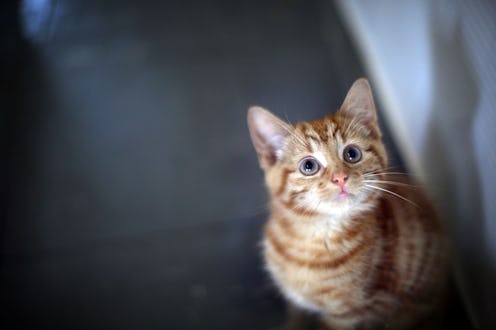
If your friends have ever made the observation to you that you and your cat are like two peas in a proverbial pod, there might be good reason for that: According to a recent study, human personality traits might affect cat personality traits within owner-pet relationships. Put more colloquially, your cat might be mimicking your personality. To which I can say only this: No wonder my cat is so weird.
The study, which was published in the journal PLOS One, sought to shed light on the relationships between the personalities of human cat owners and the “lifestyles, behavior, and wellbeing” of those humans’ cats. The researchers; hypothesis was fourfold: First, that measures of cat welfare, such as “composite scores for stress-linked sickness behaviors and house soiling,” would be affected by the cat’s lifestyle and demographic, the personality traits of their human, and the cat’s general behavioral style; second, that a cat’s general behavioral style would be affected not just by its demographic, but also by its human’s personality traits; that the personality traits of the human would affect both the initial selection of the cat and its subsequent management; and that how satisfied humans were with their cats would be affected by their own personality traits.
To test these hypotheses, the researchers first created a questionnaire with six sections covering the household demographic, the satisfaction of the cat’s human and what their thoughts were on “relinquishment” (e.g. giving their cat up), the personality of the cat’s human, demographic of the focal cat, the health and wellbeing of the focal cat, and the focal cat’s behavioral style and problems. The section devoted to the personality of the human used the Big Five Inventory to measure how the human scaled on the traits of openness to experience, conscientiousness, extraversion, agreeableness, and neuroticism.
The questionnaire was then implemented via Survey Monkey and available from June to July of 2016. It was shared in a wide variety of ways, including through social media and on the International Cat Care’s website. Participants self-selected in, although all participants were required to be at least 18 years old and to have lived with their cat for at least six months. Any participants who had more than one cat were told to choose one of their cats — the one they felt like they knew the most — as the “focal cat.” Some 3,000 people participated, after which the researchers did some heavy data analysis using the questionnaire results.
When how humans scored on the Big Five section of the questionnaire was compared with the results from the sections about cats’ health, wellness, and behavior, a number of correlations appeared: Cats were found to be more gregarious if their humans scored higher on extraversion, openness, and conscientiousness, but more aloof or tending towards avoidance behaviors if their humans scored lower on agreeableness, openness, and conscientiousness. Meanwhile, higher scores on neuroticism and but lower scores on conscientiousness for the humans lined up with cats behaving more anxiously or fearfully. (The opposite was true for humans who scored highly in conscientiousness; their cats were less likely to be behaviorally anxious or fearful.) Additionally, higher scores in neuroticism paired with lower scores in agreeableness, openness, and conscientiousness in humans also correlated with higher aggression levels in their cats.
(It’s worth noting, though — as the researchers were careful to do — that cats can’t self-report the same way humans can; as such, it may be useful to take a “grain of salt” approach with regards to it. Interestingly, humans who scored highly in neuroticism were also more likely to report cat “behavior problems.” They were also associated with “a greater expression of negative cat behavior styles. While it’s certainly possible that more neurotic humans also have more neurotic cats, it’s also possible that humans with high neuroticism scores might perceive some cat behaviors as more negative than humans with mid-range or low neuroticism scores.)
The study was largely concerned with examining whether human-cat relationships are anything parent-child relationships — and it did actually find some similarities between the two kinds of relationships. For example, humans who scored more highly on neuroticism were more likely to keep their cat from going outdoors; similarly, parents identified as anxiety-disordered in previous research had been found more likely to be overprotective towards their children. So, if you refer to your cats as your fur-children, there’s actually a lot of truth to the expression.
But the study’s findings have merit beyond the parenting metaphor, as well. For example, the researchers discovered that cat breed was “significantly associated with owner personality” — a finding which is especially interesting when taken in conjunction with another recent study on cat behavior and personality. This other study found a number of cat behavioral traits to be dependent on breed. Together, these two studies prompt questions about whether cats are really mimicking their humans’ personalities, or whether humans with specific personalities are drawn to cats with like personalities as determined by their breeds.
Either way, it’s clear that when it comes to owner-pet relationships, personalities between humans and cats can either mesh or clash just the same that personalities between two humans can mesh or clash. Thinking of adopting a cat yourself? It might be wise to make sure you really know yourself first; that might enable you to find exactly the right cat for you. After all, you’re not just looking for a companion for yourself; you’re trying to help a furry friend find their own companion, too.